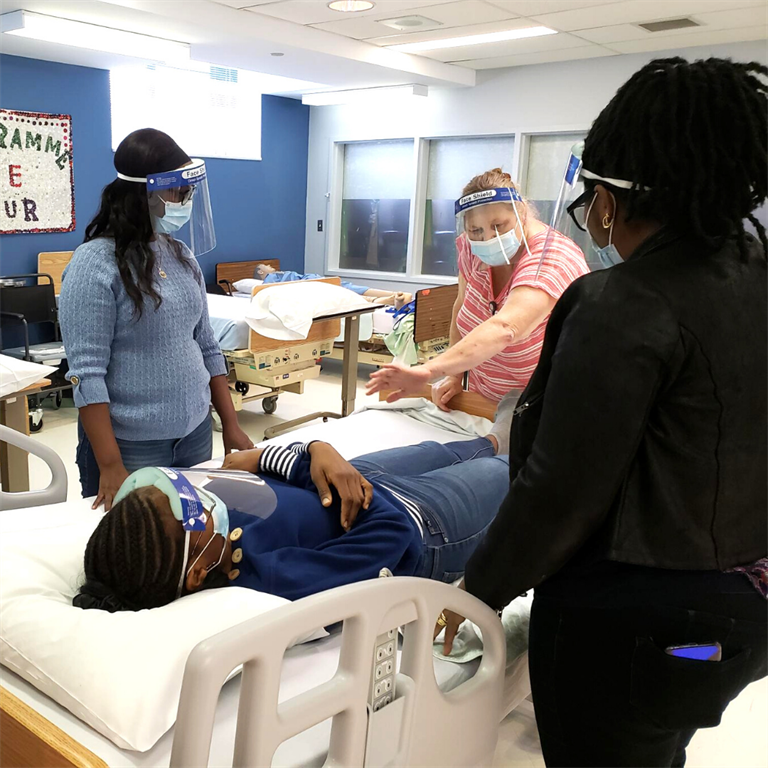Immersive Courses Bring Professionals and Students Together in Long-Term Care
06/10/2021
Over the course of the past year, frontline health care workers have been a vital support to the long-term care sector. Whether personal support workers, nurses, allied health professionals, or support staff, these roles serve our residents and their loved ones each day.
The devastating impacts of the COVID-19 pandemic have shown the challenges faced by the sector and the need for greater capacity in these roles. By the end of 2020, the Ministry of Long-Term Care launched a call to prioritize the education and recruitment of health care workers to strengthen long-term care and invest in a better future for the sector’s workers and residents.
In response, La Cité, in partnership with Bruyère’s Saint-Louis Residence, launched a Living Classroom designed to accelerate the training for new personal support workers in our community. The partnership integrates practical education sessions directly into the long-term care home to support workforce development in the sector through a culture of shared learning and real-life experience. The Ontario Centres for Learning, Research and Innovation in Long-Term Care (CLRI), which has been an integral support in the program’s launch, brings knowledge and expertise to support improvements to quality of life and care in the sector through applied research, education, and training.
“Saint-Louis Residence is thrilled to be part of this collaboration with La Cité to launch a francophone living classroom within our home,” says Melissa Donskov, VP of Residential and Community Care Programs at Bruyère. “Learning from staff within a long-term care setting is a fantastic way to prepare future personal support workers for a career in the sector. It is also engaging for our current long-term care heroes, offering them opportunities to develop in their careers and to share all of their knowledge and expertise.”

With dozens of students enrolled in the first spring training cohort, Bruyère expects to see more than 20 additional students benefit from an education directly embedded in the workplace before the end of summer. Covering many of the basic techniques for residential care, including supporting mobility and transfers, students are gaining skills firsthand and stepping into careers with confidence. In this experiential learning environment, students are learning side-by-side with our dedicated Saint-Louis Residence’s frontline staff who have stepped up as teachers and supported the program.
“This is a good opportunity for personal care work students to gain valuable knowledge at Saint-Louis Residence,” said Jesule Balmir, a student in the first classroom cohort. “This program that leads to a certificate will open the door to other related training that may be useful in the future. Our teachers are highly qualified. They give us training based on years of experience so that we are well prepared for the personal support worker profession.”
Despite still navigating the challenges of COVID-19, the outpouring of engagement and interest to train the next generation of health care workers has been overwhelming among staff members. The response from staff at Saint-Louis Residence to foster a space for compassionate and integrated learning once again shows the incredible generosity and strength of our teams that continues to ripple through the community.
“It is a privilege to be able to share the knowledge I have gained in my 40-year career as a personal care attendant. The live class not only teaches the theory, but also allows for direct practice with the students and validates if the different approaches and methods have been understood. For example, when working with a resident who has dementia, there are tips and tricks that make the experience better for the resident. Being able to directly relay these different nuances to them is great!
I love my experience as a living lab teacher at Saint-Louis Residence. We’re training the next generation of attendants, the heartfelt people who make all the difference, especially with our residents who are so vulnerable!”
—Monique Van Den Akerboom, personal support worker
“It is very motivating to take up this challenge as a living classroom teacher,” says Mireille Nduami, RPN at Saint-Louis Residence and former student at La Cité. “It is a great opportunity to bring my contribution during such a difficult time when the demand for health care workers is really a priority. By training the next generation, I too am growing and strengthening my knowledge. I am so grateful to be part of this innovative program!”
“It is truly a lesson that inspires the whole life. We had very good teachers,” said Hortense Mugandakazi Cikwanine, another student in the program.
“I find this experience very dynamic as we interchange our ideas and experience the theoretical lessons with practice which allows for a more direct and easy assimilation.
It will help us better understand the functioning of patients, their physical and psychological environment, to define our relationship with them and our responsibilities towards them.
I learned how to use the different tools necessary for the comfort and transfer of patients; I also understood the best attitude to have depending on the condition of the client to facilitate and embellish his daily life.”
— Nicole Bernisse Nkakanou Tchokotcheu, student
The Living Classroom partnership model was first implemented in Ontario through a collaboration with Conestoga College, the Schlegel-UW Research Institute for Aging (RIA) and Schlegel Villages. Conestoga and the RIA, with support from the Ontario Centres for Learning, Research and Innovation in Long-Term Care, are working to spread the model and support workforce development for the senior living sector.